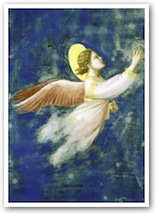Is Christopher Still a Saint?
- FR. WILLIAM SAUNDERS
Whatever happened to St. Christopher? Is he still a saint?
 |
St. Christopher is still a saint. Tradition holds that he died at Lycia on the southern coast of Asia Minor about the year 251. Various legends surround his life. The most popular is that he was a rather ugly, giant man, born to a heathen king who was married to a Christian, who had prayed to the Blessed Mother for a child. Originally named "Offerus," he carried people across the river for his livelihood. (Another source stated that he was named "Reprobus" prior to his baptism, and then changed his name.)
He converted from paganism through the teaching of a hermit, named "Babylas." Christopher believed that our Lord was the most powerful of all, more powerful than any man and one whom even Satan feared.
Again according to legend, one day one of his passengers to cross the river was a small child. As they proceeded, the child kept growing heavier; and Christopher feared that they would drown. The child then revealed Himself as Jesus, and the heaviness was due to the weight of the world that He carried on His shoulders.
According to the Roman Martyrology, he suffered martyrdom during the persecution of Emperor Decius by being shot with arrows after surviving burning.
The name Christopher means "Christ bearer." He is the patron saint of travelers, especially those driving cars. His popularity increased during the Middle Ages. However, evidence attests to widespread devotion even prior to this time: St. Remigius of Rheims was buried in 532 in a church dedicated to St. Christopher; Pope St. Gregory the Great (d. 604) mentioned in his letters a monastery dedicated to this saint; and the Mozarabic Breviary and Missal of St. Isidore of Seville (d. 636) has a special office dedicated to him.
St. Christopher is particularly venerated in Southern Germany, Austria and Northern Italy (which was part of the Austrian Empire until after World War I), because he is one, of the "Fourteen Holy Helpers," a group of saints invoked as early as the 12th century in these areas and who are honored on Aug. 8: St. Denis of Paris (headache and rabies), St. Erasmus or Elmo (colic and cramp), St. Blaise (throat ailments), St. Barbara (lightning, fire, explosion, and sudden and unprepared death), St. Margaret (possession and pregnancy), St. Catherine of Alexandria (philosophers and students, and wheelwrights), St. George (protector of soldiers), Sts. Achatius and Eustace (hunters), St. Pantaleon (tuberculosis), St. Giles (epilepsy, insanity and sterility), St. Cyriac (demonic possession), St. Vitus (epilepsy) and St. Christopher (travelers). The German Dominicans promoted this veneration, particularly at the Church of St. Blaise in Regensburg (c. 1320).
Moreover, medals of St. Christopher and car medallions or pins are still manufactured and used by the faithful. St. Christopher's feast day is still July 25, and the proper of the Mass in his honor is found in the 1962 edition of the Roman Missal still authorized for the Tridentine Mass.
The confusion over whether St. Christopher is still a saint arose when Pope Paul VI revised the Liturgical Calendar, which includes the feast days of saints that are commemorated at Mass. Due to the proliferation of the number of feast days over the centuries, the Second Vatican Council in its "Constitution on the Sacred Liturgy" proposed, "Lest the feasts of the saints should take precedence over the feasts which commemorate the very mysteries of salvation, many of them should be left to be celebrated by a particular Church, or nation, or family of religious. Only those should be extended to the universal Church which commemorate saints who are truly of universal importance" (No. 111). With this in mind, a special commission — Consilium — examined the calendar and removed those saints whose historical base was more grounded on tradition than provable fact, changed the feast days to coincide with the anniversary of a saint's death or martyrdom whenever possible, and added saints that were recently canonized and had universal Church appeal. Moreover, local conferences of bishops could add to the universal calendar those saints important to the faithful in their own country. In no way did the Church "de-canonize" St. Christopher or anyone else, despite the lack of historical evidence surrounding their lives. St. Christopher is still worthy of our devotion and prayers, and each of us should be mindful that he too is called to be a "bearer of Christ."
 This is Meaghen Gonzalez, Editor of CERC. I hope you appreciated this piece. We curate these articles especially for believers like you.
This is Meaghen Gonzalez, Editor of CERC. I hope you appreciated this piece. We curate these articles especially for believers like you.
Please show your appreciation by making a $3 donation. CERC is entirely reader supported.

Acknowledgement
Saunders, Rev. William. "Is Christopher Still a Saint?" Arlington Catholic Herald.
This article is reprinted with permission from Arlington Catholic Herald.
The Author

 Father William Saunders is pastor of Our Lady of Hope parish in Potomac Falls, Virginia. He is dean of the Notre Dame Graduate School of Christendom College. The above article is a "Straight Answers" column he wrote for the Arlington Catholic Herald. Father Saunders is the author of Straight Answers, a book based on 100 of his columns, and Straight Answers II.
Father William Saunders is pastor of Our Lady of Hope parish in Potomac Falls, Virginia. He is dean of the Notre Dame Graduate School of Christendom College. The above article is a "Straight Answers" column he wrote for the Arlington Catholic Herald. Father Saunders is the author of Straight Answers, a book based on 100 of his columns, and Straight Answers II.




